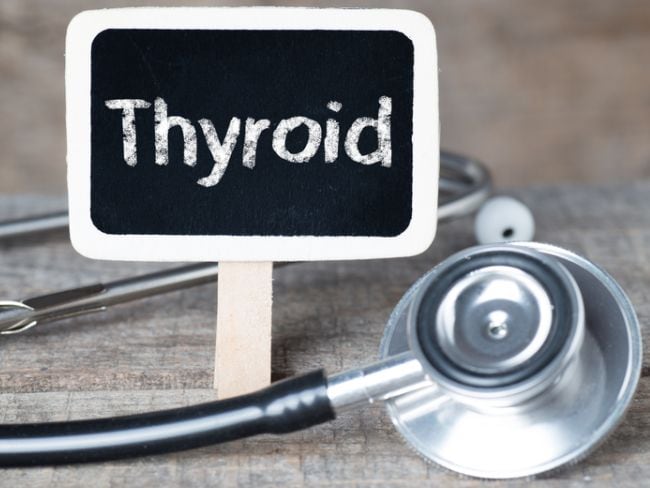World Thyroid Day 2018: Hypothyrodism is a condition which occurs when thyroid gland becomes underactive; Hyperthyroidism results in overactive thyroid gland.

World Thyroid Day 2018: Hyperthyroidism and Hypothyroidism can be controlled with medicines
HIGHLIGHTS
- World Thyroid Day is observed on May 25
- Hypothyroidism is more common in women than men
- Hyperthyroidism result in sudden weight loss
World Thyroid Day 2018 is globally recognized on May 25. Thyroid is a small gland which is located below the Adam's apple in the neck. Thyroid gland is responsible for releasing thyroxine (T4) and triiodothyronine (T3). Both these hormones are responsible for increasing oxygen levels in the body and stimulating cells to produce new proteins. Thyroid gland determines metabolic rate of most organs by controlling the release of these hormones. Thyroid gland is stimulated by thyroid-stimulating hormone (TSH), a hormone which is made by the pituitary gland in the brain. When levels of thyroid hormone in the body are high, they stop production of TSH, which in turns stops thyroid for making more T3 and T4. Hypothyrodism is a condition which occurs when thyroid gland becomes underactive. Hyperthyroidism is a condition which occurs when the thyroid gland becomes overactive. Problems with the thyroid gland are more common in women as compared to men.
 Hypothyroidism can cause weight gain
Hypothyroidism can cause weight gainThis World Thyroid Day, let's take a look on the exact difference between Hypothyroidism and Hyperthyroidism.
Hypothyroidism
Hypothyroidism is a condition in which your thyroid gland is unable to make enough hormones in order to function well. Every aspect of the body's metabolism is controlled by the thyroid gland. The condition results in slow production of thyroid by the thyroid gland. This slows down your metabolism and results in weight gain. Hypothyroidism is quite a common problem in India. The American Thyroid Association states that there is no cure for hypothyroidism. But the condition can be treated by taking proper medicines and following a healthy lifestyle. There are some medicines which help in improving the body's metabolism and restore balance in hormone levels.
Also read: Hypothyroidism Diet: Best Guidelines To Treat
The most common cause of hypothyroidism is Hashimoto's thyroiditis, a condition in which the body attacks its own immune system. Over a period of time, Hashimoto's thyroiditis stops thyroid gland from producing hormone. The condition then leads to hypothyroidism. The condition is more common in women than men. Common symptoms associated with hypothyroidism include constipation, constant tiredness and forgetfulness.

Hypothyroidism can cause fatigue
Photo Credit: iStock
Hyperthyroidism
This is a condition in which the body makes too much of T3 and T4 hormones by becoming overactive. Common symptoms of hyperthyroidism include fast-paced heartbeat, increased appetite, sensitivity to heat, anxiety and sudden weight loss. Any inflammation of the thyroid, a thyroid nodule producing excessive T4 hormone or Graves' disease (autoimmune disease) can cause hyperthyroidism.
Thyroiditis - a condition which causes inflammation and irritation of the thyroid, allows excessive thyroid to enter the blood. This condition can cause pain and discomfort. Thyroiditis can also occur as a result of pregnancy, but ends only in the short-term.
Also read: 7 Natural Ways To Prevent And Treat Hair Loss Due To Hypothyroidism
Thyroid nodules can occur in hyperthyroidism as well as hypothyroidism. These nodules are mostly benign. In case of hyperthyroidism, the nodules can increase size of the thyroid, thus resulting in excessive production of T4 hormone.
Graves' disease is a condition in which the body attacks itself. As a result of the attack, the thyroid gland produces excessive thyroid hormone.
Hyperthyroidism can be controlled by medications or treatment. Hyperthyroidism must not be left untreated as it can lead to bone loss or irregular heartbeat. The condition is said to run in families.
 Hyperthyroidism and hypothyroidism can be controlled by following a healthy lifestyle
Hyperthyroidism and hypothyroidism can be controlled by following a healthy lifestyle
Also read: 5 Causes Of Hypothyroidism You Should Know
Difference between hypothyroidism and hyperthyroidism
Weight gain, tiredness and slow metabolism are common symptoms of hypothyroidism. An underactive thyroid can further slowdown various bodily functions.
Hyperthyroidism on the other hand results in a person feeling more energetic. It causes sudden weight loss and makes a person feel more anxious.
One of the most common differences between hyperthyroidism and hypothyroidism is how they affect hormone levels in the body. While hyperthyroidism results in an increased production or hormones, hypothyroidism can decrease hormone levels in the body.
Taking proper medications and living a healthy lifestyle which involves eating clean and healthy along with regular exercising can help in dealing with conditions like hyperthyroidism and hypothyroidism.
Happy World Thyroid Day!
Disclaimer: This content including advice provides generic information only. It is in no way a substitute for qualified medical opinion. Always consult a specialist or your own doctor for more information. NDTV does not claim responsibility for this information.
DoctorNDTV is the one stop site for all your health needs providing the most credible health information, health news and tips with expert advice on healthy living, diet plans, informative videos etc. You can get the most relevant and accurate info you need about health problems like diabetes, cancer, pregnancy, HIV and AIDS, weight loss and many other lifestyle diseases. We have a panel of over 350 experts who help us develop content by giving their valuable inputs and bringing to us the latest in the world of healthcare.














